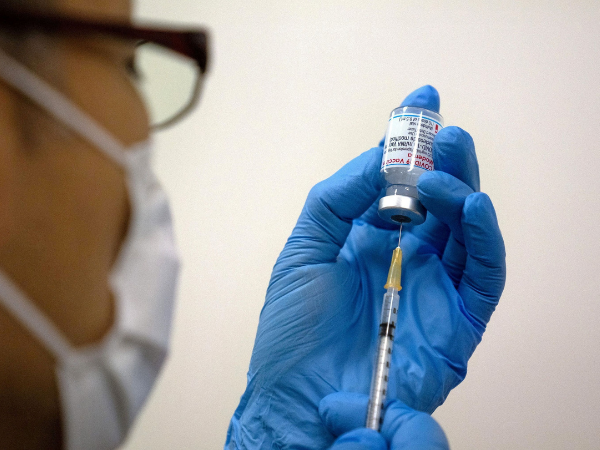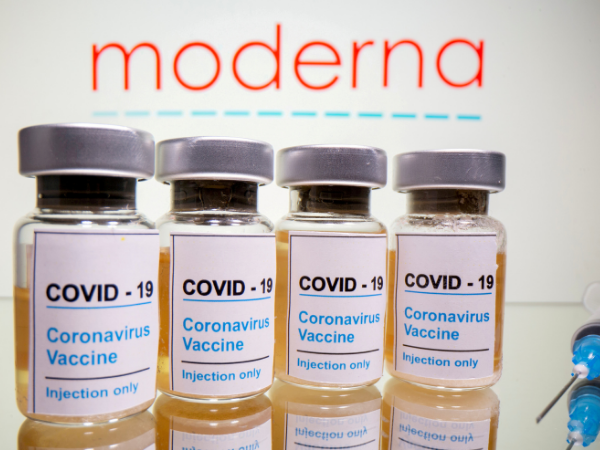Comparing Covid vaccines – which one is the best?
In almost all parts of the world, there’s an upsurge of the highly spreadable COVID-19 variant, the Delta variant. Most of the cases are among those who aren’t vaccinated yet. To get your hopes up, there are reports about the existing COVID vaccines and the big potentials of those that are still in development particularly, the booster shots.
Although each vaccine has its distinct properties, all of them offer powerful protection against diseases. Comparing covid vaccines will help you determine which is best for your health.
How effective is the Pfizer, Moderna, and Johnson & Johnson vaccine?

The medical staff prepares the Moderna coronavirus (COVID-19) vaccine at the newly-opened mass vaccination center in Tokyo, Japan, on May 24, 2021. Carl Court/Pool via REUTERS
While the United States uses three vaccines (Pfizer-BioNTech, Johnson & Johnson, Moderna), two of these – Moderna and Johnson & Johnson – are authorized for emergency use. Even if these two haven’t been fully licensed, the Food and Drug Administration has given their green light for these two to be put into use.
With so much information online about these three main vaccines, it can be overwhelming. We’ve taken time in comparing these three. Read on to assess further which COVID vaccine suits you best.
Pfizer
In mid-December of 2020, Pfizer BioNTech vaccine was the first COVID vaccine manufacturer to receive full emergency use authorization (EUA). This came after the company submitted reports with positive clinical trial data showing that the Pfizer vaccine effectively prevented severe disease. While just last August 2021, Pfizer is also the first to receive a green light for younger people ages six and older from FDA (Food and Drug Administration). Comparing the COVID vaccine can give you a heads-up of what to expect from each vaccine.
How it works: With the use of new modern technology, Pfizer was able to produce this messenger RNA (mRNA) vaccine. This delivers a bit of genetic code to cel, making it the surface protein (spike) on the SARS-2 virus. While the proteins with mRNA instructions mobilize the immune system, it also instructs the spike protein as foreign. Thus, they will then develop antibodies and immunity shields that will fight the virus.
The vaccine and its functionality
Dosage: Two doses for 21 days with protection fully effective two weeks after full vaccination
Approved and best for: Anybody aged 12 years and older. Though this COVID vaccine’s study for children ages 5-11 is on a roll-out.
Side effects: Tiredness, pain, redness/swelling of the injected part, chills, pain, and headache. All of these symptoms will subside after 1-2 days of hydration and rest. For faster recovery, medications like acetaminophen help. If symptoms persist after a 72-hour mark or you’re having shortness of breath, call your doctor.
FDA cautions: This COVID vaccine has an FDA warning label. It was “likely of association” with cases of heart inflammation in young adults. Inflammations may surface in the outer lining of the heart (pericarditis) or the heart muscle (myocarditis). Although there are 12.6 cases per million-second doses, the inflammation can get better on its own without taking any medications.
Effectiveness: Even in the early stages of vaccination, the Pfizer BioNTech vaccine has shown astonishing results. But experts continue to learn about its percentage of efficacy. The Phase 3 clinical data reported in December showed 95% of the vaccine’s efficacy of this COVID vaccine.
Effectiveness on virus mutations like the Delta variant: In comparing COVID vaccines, two studies from real COVID vaccination experiences in May. Pfizer was found at more than 95% efficacy against severe disease or death caused by Alpha and Beta variants. As for the delta variant, Public Health England reported two clinical studies.
They show that full vaccination doses are 88% effective against symptomatic disease and 96% effective against hospitalization.
Moderna
In December, Moderna’s COVID vaccine was also authorized for emergency use in the United States. While Moderna uses the same mRNA technology as Pfizer’s, it has the same vaccine efficacy level at preventing serious symptomatic disease. Since it uses the same technology, it also needs to be stored in freezer cold temperatures.
The FDA also approved Moderna’s COVID vaccine booster shots last August. It was approved for COVID cases with solid organ transplants and immune-compromised individuals.
How it works: Due to its similar technology as Pfizer’s, this mRNA vaccine sends cell instructions for making a spike protein to get the immune system ready to recognize it. Once it’s ready, the immune system will fight the spike protein (protein inside the SARS CoV-2 virus) when it detects one. In comparing the COVID vaccine, the assessment of ingredients is essential.
A closer look at COVID vaccines
Dosage: Two doses for 28 days with protection fully effective two weeks after full vaccination
Approved and best for Any young adult 18 years and older. Though children aren’t eligible for the Moderna vaccine yet, it can provide great immunity for children 12.
Side effects: Fatigue, headache, injection site pain, joint pain, chills, fever, nausea, and feeling unwell. All of these will subside within a day or two. Although mRNA COVID vaccines can trigger anaphylaxis on very rare occurrences, it is an unusual reaction that can be easy with Epipens.
FDA warnings
FDA cautions: Similar to Pfizer, and it has a warning label from the FDA due to its “likely association” with cases of heart inflammation in young adults.
Effectiveness: According to Moderna, their vaccine has higher than 90% vaccine efficacy in fighting COVID-19 with greater than 95% in extreme cases. Phase 3 studies done in the early stages showed that this vaccine is at 94.1% efficiency at avoiding the infection in people who haven’t had COVID-19 before.
The CDC (Centers for Disease Control) reported studies showing mRNA protection against COVID-19 infection is waning. But the vaccines were still effective against hospitalization.
Effectiveness on virus mutations like the Delta variant: In June, Moderna reported studies showing their vaccine efficacy against the Beta, Delta, Eta, and Kappa coronavirus variants. However, while comparing COVID vaccines, it showed to be two times weaker against the Delta variant.
Johnson & Johnson/Janssen
In February 2021, the FDA also authorized Johnson and Johnson’s COVID vaccine for emergency use. While this vaccine doesn’t use the same technology as Pfizer and Moderna, they use an effective virus vector or carrier vaccine.
Unlike the other two vaccines, the J&J vaccine can be stored in normal refrigerator temperatures. Also, this COVID vaccine only requires a single shot, making it easier to administer and distribute. Comparing the COVID vaccine requires a further assessment based on given facts.
What to watch out for
How it works: As a carrier vaccine, it uses a different method to how mRNA vaccines function. The scientists concocted adenovirus (a common virus that can cause bronchitis and other illnesses when inactivated) as a shell that carries the genetic code on spike proteins going to the cells.
With the combination of the code and the shell, you can’t be sick. But once the code enters the cells, your cells will produce spike protein that will train your body’s immune system. This will then create the antibodies needed to protect your body against COVID-19 infection.
Dosage: One-shot with protection fully effective two weeks after vaccination
Side effects: Fatigue, headache, injection site pain, chills, muscle pain, fever, and nausea. According to the FDA, It has milder side effects than that of Moderna and Pfizer. There’s no recorded allergic reaction in clinical trials.
FDA cautions: Janssen vaccine has two label warnings from the FDA. Back in July, there were reports of cases of Guillain-Barre Syndrome, a neurological disorder.
Though it was only on a small number of recipients, cases happened within 42 days after vaccination. The other label warning was due to very uncommon blood clots, and this also occurred in just a small number of vaccinated recipients.
Effectiveness: While comparing the COVID vaccine, it has an overall vaccine efficacy of 72% and 86% against other severe diseases. Last August, Johnson & Johnson announced that reliable data showed their booster shot at six months had a quick nine-fold boost in spike-binding antibodies.
The efficacy
Effectiveness on virus mutations like the Delta variant: In July, the company reported that their COVID vaccine was also effective against the Delta variant. However, one study shows that the Janssen vaccine is less effective in fighting the Delta variant. In earlier studies, the vaccine showed to be 95% effective against death and 71% effective against hospitalization.
Who should not get the Moderna vaccine?

Vials with a sticker reading, “COVID-19 / Coronavirus vaccine / Injection only,” and a medical syringe are seen in front of a displayed Moderna logo in this illustration taken October 31, 2020. REUTERS/Dado Ruvic
With Moderna’s proven efficiency, there’s not so much to doubt about. As for every medication or vaccination, there are always precautions that you need to watch out for.
Related Articles
You are still eligible to get the Moderna vaccine even if you have an existing health condition. Pregnant and breastfeeding women were also eligible for this vaccine. Here are the conditions that are not suitable for the Moderna vaccine.
- People with severe allergic reactions to the main ingredient – mRNA
- If you have an allergic reaction or severe illness after the first dose
- People allergic to Polysorbate
Key Takeaway
Whenever in doubt about receiving the vaccine due to safety concerns, consider your health and the people around you. There are only a few things to consider for legitimacy and ensure the drug administration is from the FDA.
COVID vaccines like Moderna and Pfizer have 14 days for every dose. Also, all vaccines have a two-dose regimen. Comparing the COVID vaccine is vital in this pandemic era.

